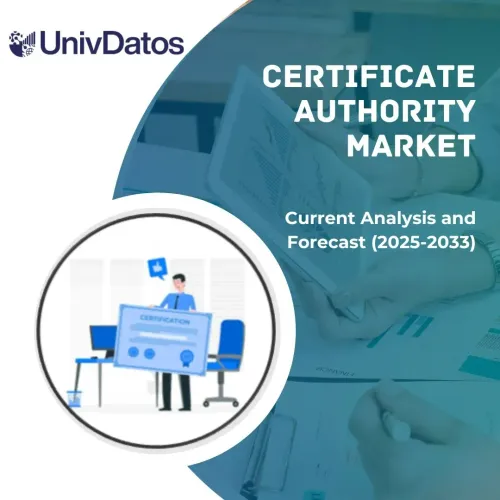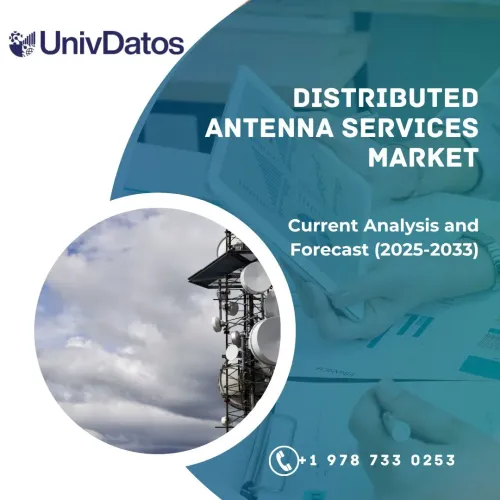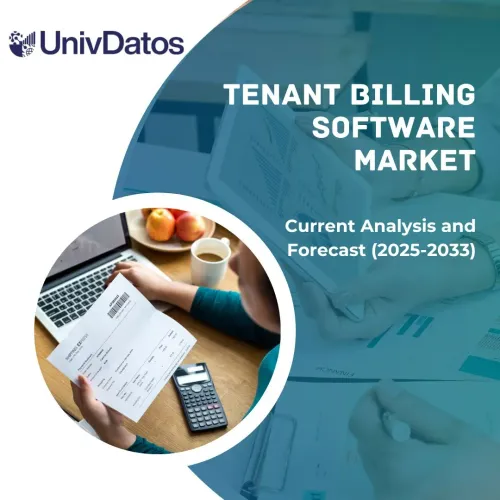- Home
- Chi siamo
- Settore
- Servizi
- Lettura
- Contattaci
Mercato Blockchain: Analisi e Previsioni Attuali (2022-2028)
Enfasi per Tipologia di Componente (Piattaforma, Servizi); Dimensione Organizzativa (Grandi Imprese, PMI); Utenti Finali (Banche, Servizi Finanziari e Assicurazioni (BFSI), Governo, Sanità, Media e Intrattenimento, Vendita al Dettaglio ed E-commerce, Trasporti e Logistica, Altri); e Regione/Paese
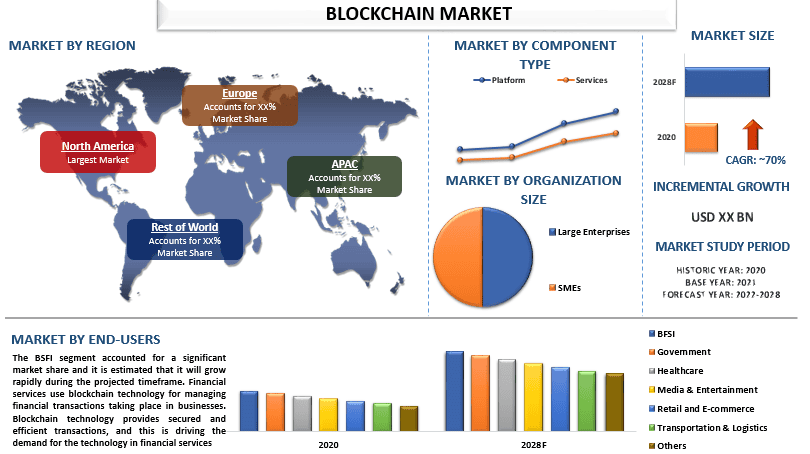
Si prevede che il mercato Blockchain registrerà un CAGR di circa il 70% nel periodo 2022-2028.Una blockchain è definita come “un database distribuito che mantiene un elenco in continua crescita di record ordinati, noti come blocchi”. La crittografia viene utilizzata per collegare questi blocchi. Ogni blocco contiene l'hash crittografico del blocco precedente, un timestamp e i dati delle transazioni. Una blockchain è un registro digitale decentralizzato, distribuito e pubblico utilizzato per registrare le transazioni su molti computer in modo tale che il record non possa essere modificato retroattivamente senza influire su tutti i blocchi successivi e richiedere il consenso della rete. La crescente domanda di blockchain può essere attribuita all'aumento dei finanziamenti di capitale di rischio nelle aziende di tecnologia blockchain in tutto il mondo.Ad esempio, nel maggio 2021, Circle Internet Financial Ltd., un fornitore di tecnologia blockchain, ha annunciato di aver raccolto 440 milioni di dollari in finanziamenti da investitori strategici e istituzionali. A causa delle statistiche eclatanti, l'aumento degli investimenti nella tecnologia blockchain in tutto il mondo sta portando alla crescente domanda di blockchain e contribuirà alla crescita del mercato anche nel prossimo periodo. Inoltre, si prevede che il mercato blockchain crescerà a causa delle aziende BSFI che adottano la tecnologia leader digitale per proteggere i dati finanziari e l'identità degli utenti finali. Tuttavia, alcune delle restrizioni nel mercato, inclusi gli elevati costi di implementazione della tecnologia blockchain, stanno ostacolando la crescita di questo mercato in tutto il mondo.
Accenture PLC, IBM Corporation, Amazon Web Services Inc, Intel Corporation, Microsoft Corporation, Oracle Corporation, Applied Blockchain, Infosys, Wipro, Tata Consultancy Services Limited sono alcuni degli attori chiave nel mercato. Diverse fusioni e acquisizioni insieme a partnership sono state intraprese da questi attori per fornire ai clienti prodotti/tecnologie hi-tech e innovative.
Approfondimenti Presentati nel Report
“Tra i tipi di componenti, la categoria delle piattaforme ha rappresentato la quota significativa del mercato nel 2020”
In base al tipo di componente, il mercato blockchain è segmentato in piattaforme e servizi. Il segmento della piattaforma ha rappresentato una quota di mercato significativa e si stima che crescerà rapidamente durante il periodo di tempo previsto. La piattaforma/soluzione consente agli sviluppatori di reti e applicazioni di registri digitali di creare reti di registri distribuiti (DLT) personalizzate per gli utenti finali. Le soluzioni basate su cloud possono essere utilizzate per sviluppare e ospitare varie applicazioni avanzate e contratti intelligenti all'interno dell'ecosistema. Inoltre, questi servizi forniscono anche supporto per l'allocazione delle risorse, la gestione della larghezza di banda, le funzionalità di sicurezza dei dati e le esigenze di hosting.
“Tra le dimensioni organizzative, la categoria delle grandi imprese dovrebbe registrare un CAGR considerevole durante il periodo di previsione”
In base al tipo di organizzazione, il mercato è frammentato in grandi imprese e piccole e medie imprese (PMI). Il segmento delle grandi imprese ha conquistato una considerevole quota di mercato e si prevede che crescerà a un CAGR significativo durante il periodo di previsione. Le grandi imprese che operano in settori quali assicurazioni, servizi finanziari, sanità e supply chain stanno sempre più facendo sforzi per digitalizzare le loro offerte, creando la domanda di tecnologia blockchain tra loro. Inoltre, le grandi imprese stanno sempre più abbracciando la tecnologia a causa della necessità di un'infrastruttura multi-parte, ovvero un'infrastruttura che coinvolge più parti, come fornitori, clienti, fornitori e la necessità di creare fiducia tra più parti a causa delle variazioni nei processi, nelle strutture, nei flussi di dati, nelle frequenze e nelle modalità di comunicazione che si aggiungono alla complessità del business.
“Tra gli utenti finali, la categoria BFSI dovrebbe registrare un CAGR considerevole durante il periodo di previsione”
In base agli utenti finali, il mercato è frammentato in banche, servizi finanziari e assicurazioni (BFSI), governo, sanità, media e intrattenimento, vendita al dettaglio ed e-commerce, trasporti e logistica e altri. Il segmento BFSI ha conquistato una considerevole quota di mercato e si prevede che crescerà a un CAGR significativo durante il periodo di previsione. I servizi finanziari utilizzano la tecnologia blockchain per la gestione delle transazioni finanziarie che avvengono nelle aziende. La tecnologia blockchain fornisce transazioni sicure ed efficienti e questo sta guidando la domanda di tecnologia nei servizi finanziari. La tecnologia blockchain consente transazioni sicure ed efficienti, il che sta guidando l'adozione della tecnologia nei servizi finanziari. A causa di fattori quali le crescenti criptovalute, l'elevata compatibilità con l'ecosistema del settore, le transazioni rapide, le Initial Coin Offerings (ICO) e il minor costo totale di proprietà, si prevede che la tecnologia sarà ampiamente adottata in questo settore.
“Il Nord America sarà testimone di una crescita significativa durante il periodo di previsione”
Per una migliore comprensione delle dinamiche di mercato del mercato Blockchain, è stata condotta un'analisi dettagliata per diverse regioni in tutto il mondo, tra cui Nord America (Stati Uniti, Canada e Resto del Nord America), Europa (Germania, Francia, Spagna, Regno Unito, Italia e Resto d'Europa), Asia-Pacifico (Cina, India, Australia, Giappone e Resto dell'APAC), Resto del mondo. Il Nord America costituisce un mercato importante per l'industria blockchain grazie alla prima adozione della blockchain e alla presenza di numerosi fornitori che forniscono soluzioni di sicurezza e blockchain e la crescente adozione della tecnologia blockchain da parte delle organizzazioni nella regione sta guidando la crescita del mercato regionale.
Motivi per acquistare questo report:
- Lo studio include la valutazione delle dimensioni del mercato e l'analisi delle previsioni convalidate da esperti chiave del settore autenticati.
- Il report presenta una rapida panoramica delle prestazioni complessive del settore a colpo d'occhio.
- Il report copre un'analisi approfondita dei principali attori del settore con un focus primario sui dati finanziari chiave del business, sul portafoglio prodotti, sulle strategie di espansione e sugli sviluppi recenti.
- Esame dettagliato di driver, restrizioni, tendenze chiave e opportunità prevalenti nel settore.
- Lo studio copre in modo completo il mercato attraverso diversi segmenti.
- Analisi approfondita a livello regionale del settore.
Opzioni di personalizzazione:
Il mercato globale Blockchain può essere ulteriormente personalizzato in base alle esigenze o a qualsiasi altro segmento di mercato. Oltre a ciò, UMI comprende che potresti avere le tue esigenze aziendali, quindi sentiti libero di metterti in contatto con noi per ottenere un report che si adatti completamente alle tue esigenze.
Indice
Metodologia di Ricerca per l'Analisi del Mercato Globale Blockchain (2022-2028)
L'analisi del mercato storico, la stima del mercato attuale e la previsione del mercato futuro del mercato globale Blockchain sono stati i tre passaggi principali intrapresi per creare e analizzare l'adozione di Blockchain nelle principali regioni a livello globale. È stata condotta un'esauriente ricerca secondaria per raccogliere i numeri storici del mercato e stimare le dimensioni attuali del mercato. In secondo luogo, per convalidare questi approfondimenti, sono state prese in considerazione numerose scoperte e ipotesi. Inoltre, sono state condotte anche esaurienti interviste primarie, con esperti del settore in tutta la value chain del mercato globale Blockchain. Dopo l'ipotesi e la convalida dei numeri di mercato tramite interviste primarie, abbiamo impiegato un approccio top-down/bottom-up per prevedere le dimensioni complete del mercato. Successivamente, sono stati adottati metodi di scomposizione del mercato e di triangolazione dei dati per stimare e analizzare le dimensioni del mercato dei segmenti e dei sottosegmenti a cui appartiene il settore. La metodologia dettagliata è spiegata di seguito:
Analisi delle Dimensioni Storiche del Mercato
Fase 1: Studio Approfondito delle Fonti Secondarie:
È stato condotto uno studio secondario dettagliato per ottenere le dimensioni storiche del mercato del mercato Blockchain attraverso fonti interne dell'azienda comerapporto annuale e rendiconti finanziari, presentazioni delle performance, comunicati stampa, ecc.,e fonti esterne tra cuiriviste, notizie e articoli, pubblicazioni governative, pubblicazioni dei concorrenti, report di settore, database di terze parti e altre pubblicazioni credibili.
Fase 2: Segmentazione del Mercato:
Dopo aver ottenuto le dimensioni storiche del mercato del mercato Blockchain, abbiamo condotto un'analisi secondaria dettagliata per raccogliere approfondimenti storici del mercato e la quota per diversi segmenti e sottosegmenti per le principali regioni. I principali segmenti inclusi nel report come il tipo di componente, le dimensioni dell'organizzazione e gli utenti finali. Ulteriori analisi a livello di paese sono state condotte per valutare l'adozione complessiva dei modelli di test in quella regione.
Fase 3: Analisi dei Fattori:
Dopo aver acquisito le dimensioni storiche del mercato di diversi segmenti e sottosegmenti, abbiamo condotto un'analisi dettagliataanalisi dei fattoriper stimare le dimensioni attuali del mercato del mercato Blockchain. Inoltre, abbiamo condotto l'analisi dei fattori utilizzando variabili dipendenti e indipendenti come l'aumento dei finanziamenti di capitale di rischio nelle aziende di tecnologia blockchain a livello globale. È stata condotta un'analisi approfondita degli scenari dal lato della domanda e dell'offerta considerando le principali partnership, fusioni e acquisizioni, l'espansione del business e i lanci di prodotti nel settore del mercato Blockchain in tutto il mondo.
Stima e Previsione delle Dimensioni Attuali del Mercato
Dimensionamento del Mercato Corrente:Sulla base di approfondimenti utili dai 3 passaggi precedenti, siamo giunti alle dimensioni attuali del mercato, ai principali attori nel mercato globale Blockchain e alle quote di mercato dei segmenti. Tutte le quote percentuali richieste suddivise e le scomposizioni del mercato sono state determinate utilizzando l'approccio secondario sopra menzionato e sono state verificate tramite interviste primarie.
Stima e Previsioni:Per la stima e la previsione del mercato, sono stati assegnati dei pesi a diversi fattori, inclusi driver e tendenze, restrizioni e opportunità disponibili per gli stakeholder. Dopo aver analizzato questi fattori, sono state applicate tecniche di previsione pertinenti, ovvero l'approccio top-down/bottom-up, per arrivare alle previsioni di mercato relative al 2028 per diversi segmenti e sottosegmenti nei principali mercati a livello globale. La metodologia di ricerca adottata per stimare le dimensioni del mercato comprende:
- Le dimensioni del mercato del settore, in termini di entrate (USD) e il tasso di adozione del mercato Blockchain nei principali mercati a livello nazionale
- Tutte le quote percentuali, le suddivisioni e le scomposizioni dei segmenti e dei sottosegmenti di mercato
- I principali attori nel mercato globale Blockchain in termini di soluzioni offerte. Inoltre, le strategie di crescita adottate da questi attori per competere nel mercato in rapida crescita
Validazione delle Dimensioni e della Quota di Mercato
Ricerca Primaria:Sono state condotte interviste approfondite con i Key Opinion Leader (KOL) inclusi i Dirigenti di Alto Livello (CXO/VP, Responsabile Vendite, Responsabile Marketing, Responsabile Operativo e Responsabile Regionale, Responsabile Paese, ecc.) in tutte le principali regioni. I risultati della ricerca primaria sono stati poi riassunti e sono state eseguite analisi statistiche per dimostrare l'ipotesi formulata. I dati della ricerca primaria sono stati consolidati con i risultati secondari, trasformando così le informazioni in approfondimenti utili.
Suddivisione dei Partecipanti Primari in Diverse Regioni
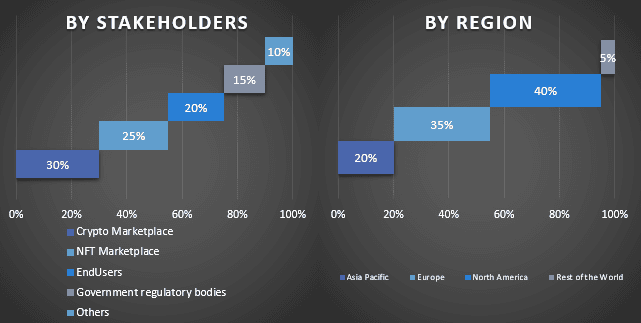
Ingegneria del Mercato
La tecnica di triangolazione dei dati è stata impiegata per completare la stima complessiva del mercato e per arrivare a numeri statistici precisi di ogni segmento e sotto-segmento del mercato globale Blockchain. I dati sono stati suddivisi in diversi segmenti e sotto-segmenti dopo aver studiato vari parametri e tendenze nelle aree del tipo di componente, delle dimensioni dell'organizzazione e degli utenti finali nel mercato globale Blockchain.
L'obiettivo principale dello studio del mercato globale Blockchain
Le attuali e future tendenze del mercato globale Blockchain sono state individuate nello studio. Gli investitori possono ottenere informazioni strategiche per basare la loro discrezione sugli investimenti sull'analisi qualitativa e quantitativa eseguita nello studio. Le tendenze attuali e future del mercato hanno determinato l'attrattiva complessiva del mercato a livello regionale, fornendo una piattaforma per il partecipante industriale per sfruttare il mercato inesplorato a beneficio del vantaggio del first-mover. Altri obiettivi quantitativi degli studi includono:
- Analizzare le dimensioni attuali e previste del mercato Blockchain in termini di Valore (USD). Inoltre, analizzare le dimensioni attuali e previste del mercato dei diversi segmenti e sotto-segmenti
- I segmenti nello studio includono aree del tipo di componente, delle dimensioni dell'organizzazione e degli utenti finali.
- Definizione e analisi del quadro normativo per il settore del mercato Blockchain.
- Analizzare la catena del valore coinvolta con la presenza di vari intermediari, insieme all'analisi dei comportamenti dei clienti e dei concorrenti del settore.
- Analizzare le dimensioni attuali e previste del mercato Blockchain per le principali regioni.
- I principali paesi delle regioni studiate nel rapporto includono Asia Pacifico, Europa, Nord America e Resto del mondo.
- Profili aziendali del mercato Blockchain e le strategie di crescita adottate dagli attori del mercato per sostenersi nel mercato in rapida crescita
- Analisi approfondita a livello regionale del settore
Correlati Report
I clienti che hanno acquistato questo articolo hanno acquistato anche






